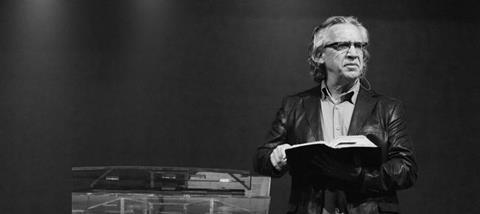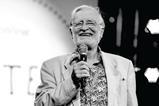Charismatics from around the world have been flocking to Bethel Church in Redding, California, to experience its ongoing focus on worship, miracles and revival. Greg Downes speaks to Bethel’s leader Bill Johnson about faith and doubt, hunting and healing – and his hope for revival.

As I sat in reception waiting to meet with Bill Johnson at the Bethel Church offices on a perennially sunny Redding morning, I reflected on the seeming incongruity of me being there. I had an opportunity for a sabbatical between posts and had chosen to go to Bethel Church, much to the surprise (and even consternation) of some of my friends.
Bethel Church is a charismatic megachurch led by Johnson, aged 64. He and his wife Beni had been on staff at Bethel previously when Johnson’s father was pastor and returned to take up senior leadership in 1996, after 17 years leading Mountain Chapel in nearby Weaverville.
In 1995, Johnson travelled to the Toronto Airport Christian Fellowship (home of the ‘Toronto Blessing’) and prayed, ‘Lord, if you touch me again, I will never change the subject’ (of seeking the presence of the Lord for revival). God did, and Johnson hasn’t.
THE REALITY OF GOD IN MY LIFE IS SO STRONG THAT IF I DOUBTED HIS EXISTENCE I’D HAVE TO DOUBT MINE
Johnson and Bethel inevitably have critics outside the charismatic Church, but also within the movement. Some UK charismatics are wary of Bethel because it teaches that it is God’s will for everyone to be healed. Johnson is no stranger to controversy. I first heard him speak at a Harrogate leaders’ conference (he is speaking there again in 2015), during which he raised hackles when a church leader asked him: ‘What is your theology of suffering?’ Johnson’s response was as articulate as it was provocative: ‘I don’t have one. I refuse to have a theology for something that shouldn’t exist.’
I was to learn much later that the provocation was deliberate and I’d rather missed Johnson’s point. It was to get people to think and was in fact shorthand for saying: I’m not going to have a more sophisticated theology for why God doesn’t heal than why he does.
This deliberate intention to focus on the substance and not the shadow (to use CS Lewis’ metaphor) is a grand theme of Johnson’s preaching, as is his prophetic ability to provoke people to come to the Bible afresh and consider what it really says rather than simply accepting the received hermeneutic of a particular theological tradition. (‘God never violates his word. But he’s quite comfortable violating our understanding of his word.’) This partly explains why Bethel Church Redding has grown exponentially under his leadership and has become an international centre of revival, healing, mission and worship.
Your dad was obviously a massive influence on you. Can you say why?
He lived at home the way he lived in public. What he preached, he lived. There was consistency; there was great integrity. He had tremendous compassion, mercy and love for people. He was a true worshipper and what probably affected us more than anything was that he was a true lover of God and he loved his family.
As a fifth-generation pastor, was there an expectation for you to go into church leadership?
There was no expectation. My parents never mentioned it to me once in my life. I have jokingly shared the fact that their hope for me was that I just make it to heaven!
Is it true that you like fast cars and big guns? What would you say to Christians who do not think these are appropriate for a pastor?
I don’t drive fast. I have a car that goes fast but I keep to the speed limit! I like it because of its excellence and I do value excellence. I really do gravitate towards excellence wherever I can find it, whether it’s a well-made fountain pen, someone who pays special attention to their job, or the design of Apple computers versus all the other nonsense equipment.
ANYWHERE I SEE HUNGER WITH HUMILITY I KNOW BREAKTHROUGH IS IN THE AIR
I enjoy hunting and I like providing food for my table. That’s something [that is] very special to me. If you eat meat you either pay someone to kill the animal or you do it yourself. Paying the rancher or the farmer to do it for you is no more moral than doing it yourself.
You have a privileged global perspective on the Church that few people share, because you travel extensively. What exciting things do you see God doing at the moment?
I see hunger everywhere.
Anywhere…I see hunger with humility I know breakthrough is in the air. I’ve seen hunger in the UK for a long time, but just recently I’ve started to see a measure of humility that is at another level. I see this happening in the UK, Switzerland, all over Asia, Australia, New Zealand and Brazil. We need it here in the US.
How do we cultivate ‘hunger with humility’?
To cultivate humility we need to return to the simple things. Complicated Christianity only thrives where no experience is required. Where we have arrogance this is often a product of ideas without experience.
Paul was the arrogant one until he got knocked off his donkey at his encounter [on the road to Damascus]. He didn’t walk away arrogant, seeing the books he would write in the future; he walked away humble and devoted.
Sometimes I’m in the family room with my wife watching TV and she asks if I want something to eat and I say, ‘Yes, I’m starving.’ I wasn’t starving enough to go and get some food myself, but if it’s convenient and she’s prepared to bring me some food, I’ll eat it. There are two sorts of hunger: the ‘I’ll go out and hunt for it because I’m so hungry’, and there’s convenient hunger: ‘I’ll eat if you feed me’. The kind of breakthrough we need in the nations will only be accomplished by the former.
There’s a big emphasis on faith at Bethel. Do you ever have doubts about God’s nature or existence?
Those are things I don’t deal with any more. The reality of God in my life is so strong that if I doubted his existence I’d have to doubt mine. It would make no sense. It’s a foolish thought to entertain.
There are struggles to believe for the impossible always, but as a friend of mine said: ‘Faith isn’t the absence of doubt, it’s the presence of belief.’ I have an option what I feed my heart with and it’s not a psychological game. I’m going to feed my heart with God’s promise, history and testimony.
Some in the UK have hailed you as the ‘new John Wimber’. He had a massive influence on the Church here. Was he an influence on you?
I never got to meet him. I only sat in a few meetings where he spoke, and I was privileged to do so. The influence he had on me was primarily that he taught me a different way to approach healing.
My background was healing in the big meetings, and I wasn’t a big meeting person. When I went to Wimber’s conferences I saw healing done in a one-on-one and more personal manner, and I was encouraged and impressed by this model that I could follow.
Also, I went home realising that I had the same theology that he had, but not the fruit and the experience to back it. Seeing the model that Wimber and the Vineyard
[Movement] provided for us really gave us permission to take risks. He was a great man and a great hero of the faith.
But you do differ from Wimber. He took the view that God can heal when he sovereignly chooses; the now and the not yet. Why do you believe it’s always the will of God to heal?
Jesus healed everyone who came to him and he is perfect theology. If I’m using him as the model, then I can’t lower the standard because I don’t see everyone healed. I can’t make up a theological reason that he didn’t demonstrate.
A big problem in this position is that it’s pastorally untenable. What about when people do not get healed?
You have to teach people how to live with mystery. I can’t change the example Jesus gave to fit what we’re experiencing, but what I can do is teach people to live in the grace of what we’re experiencing, because all things work together for good. It doesn’t mean all things were designed by God. Not all things that happen are God’s will.
I won’t change my theological standard of what to expect in life and I won’t blame God, myself or the sick person. I’m not going to say ‘it’s because you don’t have faith’ – that’s not sound theologically – it says in James 5:15 ‘the prayer of faith [will] heal the sick’ (Darby Translation).
The responsibility is on me as the one who prays. I’d rather teach people to expect the best and then learn to walk through mystery if it doesn’t happen than I would to lower our expectations.
The ‘culture of honour’ is also something Bethel is famous for, but some have said that it can appear to be soft on sin. When Todd Bentley (of the ‘Lakeland Revival’) stepped down due to moral failure and then turned up at Bethel, he received a standing ovation.
He came to a leaders’ event a couple of years afterwards. Anyone who knows how we work in private knows that we’re not soft on sin, but I won’t make public my conversations with Todd so that people will think I’m hard on sin. My conversations with Todd are very personal and private. Honour only works if you’re confrontational. You have to have the willingness to confront in order to make honour valuable, otherwise it’s just flattery.
You visit the UK frequently. What is your opinion of the British Church, and what are your hopes for its future?
The UK has such a brilliant history; there’s so much revival history and so many great leaders in the past and present. My hope is that what your forefathers prayed for and sowed into would be fully realised. I feel like it’s a privilege for me to have any opportunity to speak into that destiny, but also I stand as an observer to celebrate that destiny.
There’s a unique grace on the UK which is glorious and wonderful, and I’m looking for an outpouring of the Spirit and for a great revival to impact every sphere of society in the UK. I have great hope for that because of what we started with: the hunger and the humility that I see increasing.
SEEING THE SPIRIT MOVE AT BETHEL
Bethel Church has been a place of pilgrimage for charismatics who travel from across the globe to attend its high-energy ministry conferences. While the leadership tends to play down apparent physical manifestations of the Spirit, many have reported unusual and controversial phenomena during worship meetings.
The Glory Cloud. In October and November 2011, a sparkling gold cloud seemed to appear at the side of the stage while the band sang ‘Show Me Your Glory’. Many present took this as a sign of God’s ‘Shekinah’ presence in the
meeting, and it was captured in amateur video footage. This phenomenon has been reported on a number of other occasions.
The Bird Feathers. Earlier in the history of Bethel, there were reports of bird feathers floating down onto participants during worship meetings. Johnson says he was convinced that birds had been nesting in the air conditioning units until
others reported the same phenomenon in homes and restaurants.
The Gold Dust and Diamonds. Some attendees at Bethel’s services claim to have found their hands covered with gold dust, or have discovered small diamonds or gems appearing on the floor during worship services or in their homes. Other charismatic churches have reported similar phenomena.
The Dead-Raising Team. A group of students from Bethel’s School of Supernatural Ministry is willing to go (according to the website) ‘to the funeral home, morgue or family’s home where the deceased is being kept’. The team claims to have seen at least 12 resurrections of dead people through its prayers.
Critics of the church believe that the reports are exaggerated or invented. However, Johnson describes the phenomena as ‘signs that make you wonder.’ He says, ‘You can’t invite God into your house and not expect to have something outside of your box happen.’





































